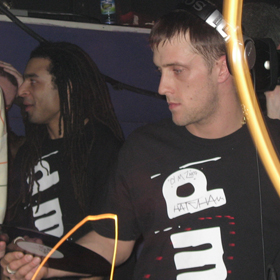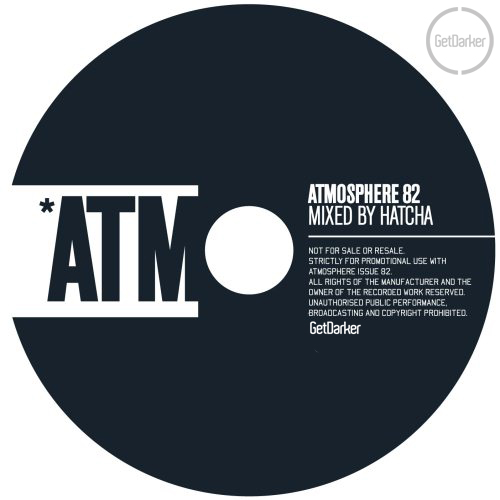
DJ Hatcha, considered by most to be the main personality behind the creation of Dubstep (he even came up with the term) was interviewed by Pipecock Jackson and WSJR’s own Richardson Heights in the back yard at The Green Elephant on the occasion of the 2nd anniversary of Dallas’ Dub Assembly. Hatcha talked about the inception of the dubstep sound, back when it was just a handful of people and a single London record store, as well as his habits as a DJ and producer. Read it:
Pipecock Jackson: How’d you get hooked up with Jason (Mundo) and Dub Assembly?
DJ Hatcha: Uh, well, what happened was, um, Jason come into a record shop I was running…
Pipecock: Big Apple?
Hatcha: Yeah, Big Apple Records, I was running that. Me and Artwork and another guy, John Kennedy, we used to run the record shop. What was happening was, I was playing a load of kind of dark, instrumental 2-step garage type stuff, and it was getting darker and darker, then I started to create a set of it, and then I was playing the sets out, and people were saying to me, “What music are you playing?”, so I started to call it “dubstep”. So, I called it “dubstep”. And then, from the shop, you know, like Skream and Benga used to come into the shop when they was very young, they was making music, when they was like thirteen or fourteen, and Digital Mystikz, Mala, Coki, Loefah, them guys would come in with the music they was making, and give it to me… I just used to go and do my radio show, play all the stuff I was getting on the decks from all the young boys [the background music gets really loud — we move outside], yeah, we just formed dubstep.
Pipecock: Where were you getting those tunes, back when things started to turn a little bit darker?
Hatcha: Well, Benga and Skream and kids like that were coming into the shop and I was explaining to them the kind of music that I wanted them to make.
Pipecock: So you were kind of “directing” the sound, then?
Hatcha: Yeah, I was kind of like explaining the sound, you know, the tribal influence, the bass lines, all that kind of stuff, and you know over time, everyone just seems to catch on and see what kind of angle you’re going down and start making the right kind of music.
Pipecock: Eight years ago, Dubstep was such a regional movement – it was a London thing…
Hatcha: It was a Croydon thing.
Pipecock: So, what do you think explains its worldwide popularity? They way that it has mutated and spread like, as Kode9 puts it, an audio virus.
Hatcha: Worldwide, the reason I think that it’s gone so big, so quick, is because of the Internet. Without a doubt. The Internet wasn’t around when drum and bass first launched. That took a lot longer to catch on, you know. But, yeah, no doubt it’s the Internet. For sure.
[awkward pause]
Pipecock: Do you see a cultural exchange occurring with overseas dubstep now feeding back into England?
Hatcha: Yeah, definitely. It’s developed into a scene. You know, dubstep has gone from our bedroom in Croydon, to a worldwide phenomenon to a certain extent. It’s just amazing, it’s just worldwide just like that. I’ve seen it all before. Back in 2001, 2002, 2003, I was playing in America, and dubstep, everyone was kind of interested, but no one wanted to make the first kind of “move”, and it went quiet for a couple of years. And then some of the producers into the music started making some really good dubstep that was catching on to people, you know the trendy magazine guys. Then they started doing write-ups, and interviews, and things, and it just starts to kind of develop from there, you know.
Pipecock: What do you think it was that made it blow-up? Was it the heaviness of the half-step movement that really caught on?
Hatcha: No, it was grime music and garage music at first…
Pipecock: I guess I meant when it started going worldwide.
Hatcha: Yeah, well it wasn’t half-step, it was still dubstep, it was never called half-step or four-step or anything. The thing is with dubstep, which makes it so interesting to any other scene, you’ve got the drum and bass [makes drum and bass noises], and it’s like that all night, from start to finish, same tempo, same beat, all the way through. With house, you’ve got Boom, Boom, Boom, Boom. With dubstep, it’s all at the same BPM, it’s all at 140 BPM, but it’s everywhere. You’ve got so many different producers that produce the half-step sound, the more bangin’ sound, the tribal sound, the reggae sound, the more techno-y sound. So, with dubstep there are so many musical influences, innit’? That’s why it’s such an interesting kind of sound.
R. Heights: You can be a lot more experimental.
Hatcha: Yeah…
Pipecock: And that’s what drew me to it also, the fact that there’s not a “sound” necessarily, aside from the tempo and the bass. That’s what made it so flexible. I’m a huge reggae fan, and the reason it sounds just as fresh today as it did back then is due to the basic elements of music: the rhythm, the bass and drums. And you can put whatever the fuck you want on top of it. There’s even more cross-pollenization with dubstep these days and it’s free…
Hatcha: And now you’ve got people like Shy FX and bloody all big fucking massive DJs, house DJs, drum and bass, they’re all putting in a sneaky dubstep track in their sets here and there. Because they can do it with that track, because that’s a different kind of dubstep track, it’s a fast dubstep track, or a half-step track, you know? Which I think there are certain people out there in the scenes now, that are getting now a bit kind of funny with the dubstep movement, cause it is kind of blowing very fast. But it’s only because it’s an incredible music. It’s not just a stereotype — drum n bass, you go there, you know exactly what to expect, like I said, it’s just [makes human beat box sounds] …it’s going to be like that all night. With dubstep, you can have a line up of DJs that will all play their own sound, you know?
Pipecock: That’s what’s going to give it longevity, I think…
Hatcha: Yeah, definitely for sure.
Pipecock: I’ve read a lot of Martin Clark‘s writing on dubstep and grime…
Hatcha: Yeah, my good friend.
Pipecock: It’s fascinating.
Hatcha: Yeah, he’s brilliant.
Pipecock: Something he wrote that I found interesting was that he talks about dubstep and grime in particular being intrinsically tied to their environment. Do you agree with that in the sense that… is it going to work outside of an urban environment?
Hatcha: Look, it’s already happened.
R. Heights: Here we are in the suburbs.
Pipecock: That’s what I think, but I might be misunderstanding what he said…
Hatcha: Well, I don’t know, I didn’t read the write-up, but it touches everyone. The music gets everywhere, it gets in every nook and cranny. Most of us guys, the originators from the dubstep scene, we fly all over the world. Like you go to Istanbul, Budapest, you go to third-world countries, and they’re kickin’ it. I’m playing Israel when I get out of here. When I get back to England I’m going to Israel, then Croatia, like Germany, Prague. You get there, and it’s fucking kicking. And you’re like “oh my gosh”. And the music’s proper affecting to touch people everywhere.
Pipecock: You’ve got an album coming out.
Hatcha: It’s not an album, it’s an EP,
Pipecock: With Kromestar?
Hatcha: Yeah, it’s a double-pack. Only a double-pack vinyl. It looks like an album, but it’s double vinyl, but it’s not a particular album. We just spent some time in the studio, knocked out some tracks and are putting them out in a double pack.
Pipecock: Can you describe your production methods?
Hatcha: What from the studio to vinyl?
Pipecock: No, when you go to write a track, is there a specific process that you follow or is it just whatever happens?
Hatcha: In the studio, we start laying down some riffs, some drums, some kicks, you start humming some rhymes that’s in your head, you start humming some bass lines, you just make the idea in your head as you’re going. It’s just straight out of the brain, straight onto the screen.
Pipecock: You usually start with your beats, start with your drums?
Hatcha: Yeah, we normally start with drums, or some kind of humming to a certain extent. You’re sitting there humming the bass, you’re just sitting there working on something. It’s whatever floats your boat at that time. Sometimes you walk into the studio and you’re straight on it, you put the beat straight down. Or you come in and something’s been playing on your mind all night. And you’re like, yeah that riff I was singing last night before I went to sleep, and you’re trying to bring it back up again. So, there are so many different ways to go about building a track and every time you go in again, you approach it in a different way.
Pipecock: And what’s influenced that?
Hatcha: The dubstep?
Pipecock: No, what’s influenced you… I was listening to a 12″ you did with Benny Ill, “Highland Spring”.
Hatcha: We did that in 2001.
Pipecock: I was listening to that and I was listening to “Flippin'”, and thinking about the difference between the two records…
Hatcha: Very melodic, kind of…
Pipecock: Yeah, completely different.
Hatcha: The stuff I play, I like, when it was hard, when it first started, I’d play at a club, and I was the first dubstep DJ, so, you’d play at a club and then a couple of weeks later you’d turn up at the club again and the other DJs are playing the same records you were playing, so I kind of try to keep up above the rest, kind of. At the moment I like very dark, aggravated dubstep. Like fucking metal on fucking metal, you know what I mean, just aggy. Just very gritty, moody, kind of progressive. Very up-tempo.
Pipecock: You like the Distance tracks?
Hatcha: I like Distance. I love Distance. Great lot. Most of these guys we’ve all grown up together in this thing, like me, Distance, like Digital Mystikz boys, Benga, Skream, we’ve all grown up together, so it’s literally like [makes telephone-to-ear motion] “Great, I’m playing out tonight.” — “Alright, I’m coming to get some new records.” You go straight round, take the newest ones off the desktop, then I’d go to the cutting house, cut them on to dubplate, go to a rave, play it.
Pipecock: That’s what makes it more amazing to me, or I think it would be more amazing to you to think about how this was just you guys, pretty much, and now it’s blown up worldwide…
Hatcha: Of course, when you’re first there and you’re trying everything to create a scene, it’s just a little seed. And when it blossoms into a flower, it’s the scene. You have no control of it any more. At first you was doing your hardest to push it out, giving out CDs, now it’s just gone on its own. It’s like a kid, it grows up and you just let him be. So, the scene has now evolved into a well established scene. But it’s not as well established as drum and bass or house. Nowhere near it, no matter what anyone says, but we’ve still got a good few years of growing to go. But the feedback now that we get is amazing, and I’m sure that no other scene would have had this much feedback at this early a stage, you know what I mean?
R. Heights: The community seems really positive.
Pipecock: Yeah, does it still have that positive vibe in London?
Hatcha: Yeah, it’s brilliant. The attitude’s not there. It’s just the new trendy thing. You know, all the trendy people go there, and all the students. It’s not attracting the boy from the corner, you know the one that’s fucking got his knife and all that. It doesn’t attract that kind, but every scene has that crowd, and it’s only a matter of time until that gets sucked in. To be honest I’ve played at dubstep raves and I’ve seen people get dragged into the crowd and robbed, and come back out covered in blood, crying, but you see it everywhere you go. So, what do you do with it? What can be done? It’s just society innit’, today.
R. Heights: I’ve seen it at a Mandy Moore concert.
Hatcha: Yeah. It happens fucking everywhere.
[another awkward pause]
Pipecock: How is your approach to DJing different from your approach to producing?
Hatcha: I’m a DJ. So, when I turn up, I like to give them a story. I like to start somewhere, build the crowd up, go down. Whereas, a producer is in the scene for making music. I’m in the scene for playing music. You know, if I wanted to spend every fucking day in the studio making music, then I’m just another producer. I’m lucky enough, cause if you’re a DJ coming into a scene now… fuck me, you’re fighting a losing battle. It’s just so hard to get exposure, to get into it. So, to get into a scene now you have to be a producer. You have to produce the big tracks, people catch onto you, then you start getting booked for DJ work as well. You know what I mean? So, it’s just totally two different things.
Pipecock: So, as a DJ do you tailor your sets to what you think the crowd wants to hear? Or do you take it as a chance to educate… to play what you want them to hear?
Hatcha: I tend to educate. For sure.
Pipecock: What do you think the difference is between the crowds here in the US and in the UK?
Hatcha: You guys have got more bollocks.
Pipecock: Really? I wouldn’t have…
Hatcha: Very more, kind of up fucking there, kind of. Well, most of the places I’ve been are very… they’re rearing to go. You go to the other place and they’re like, [makes mopey face] “What’s this?”. But when you get there next year, there’s another ten people and then the year after there are thirty more people… Last night I played in… [thinks for a moment] Denver, Colorado. Crowd was wicked, man. I played in San Fran the other week, that was wicked, LA was kickin’. I played [last night] in la, la, la, la, la… I played in Austin, that was cool. And now I’m here in Texas so we’ll see what you guys are made of.
Pipecock: I think that’s all I have here. Thanks.
Hatcha: That’s cool, have a good night. …the kind of stuff I’m going to play later on, you’ll be like “f’wuck me that is animal shit“, it is just fucking power house. Some people will listen to it and “well, that’s not dubstep”, and I say that’s just the interesting thing. There are so many sounds in the one fucking scene… you’re never going to get bored. That’s a good thing. Alright, we’ll have a drink, have a laugh, get some girls, and see how it goes.
An Awkward Postlude: On The Couch With Richardson Heights
The awkwardness was all mine. Hatcha is genuinely affable and engaging, and was happy to answer any questions. About a half hour after the interview above, he sat down next to me on the couch back by the pool table. I obviously didn’t have the recorder running, but here is some of what we talked about, approximately– he prefers to use FL Studio™ 7 as a sequencer, and he said Skream and some of the others are on FL Studio 8. We talked about FL Studio’s ease of use, and then started comparing VST plugins we use. His favorites are LinPlug Albino™ and the Native Instruments plugins Massive™ and Absynth™. And he uses Logic™ as a multi-tracker. He said being on tour is extremely lonely, the phone bills to back home are pretty bad, and he misses his son. We talked about the great magazine photos of him and his son in his MySpace profile. He was just resting up the next day in Dallas, with nothing to do. He was staying at the Renaissance Hotel downtown, and thought it was a really nice hotel. Before he went on stage, I told him to make us proud. His response: “That’s the fucking point, innit’?”
Source: weshotjr



Be the first to comment